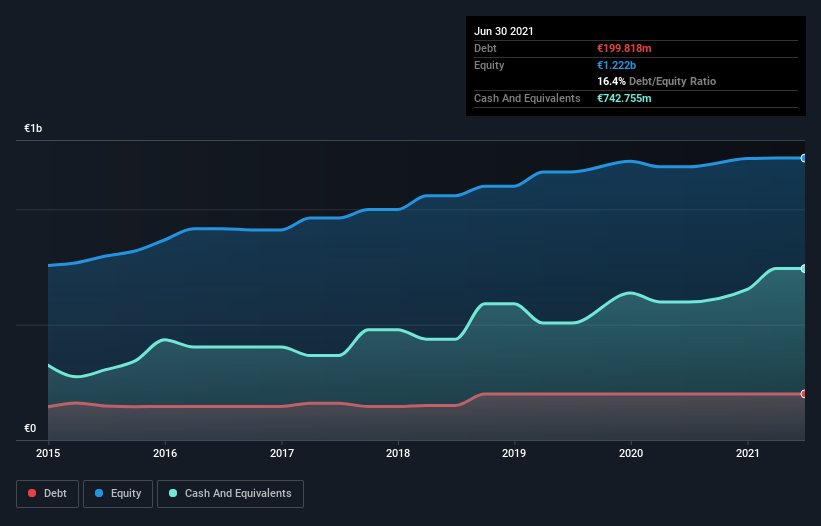
The external fund manager backed by Berkshire Hathaway's Charlie Munger, Li Lu, makes no bones about it when he says 'The biggest investment risk is not the volatility of prices, but whether you will suffer a permanent loss of capital.' It's only natural to consider a company's balance sheet when you examine how risky it is, since debt is often involved when a business collapses. We can see that Jumbo S.A. (ATH:BELA) does use debt in its business. But the more important question is: how much risk is that debt creating?
When Is Debt A Problem?
Debt assists a business until the business has trouble paying it off, either with new capital or with free cash flow. If things get really bad, the lenders can take control of the business. However, a more usual (but still expensive) situation is where a company must dilute shareholders at a cheap share price simply to get debt under control. Of course, plenty of companies use debt to fund growth, without any negative consequences. When we think about a company's use of debt, we first look at cash and debt together.
View our latest analysis for Jumbo
How Much Debt Does Jumbo Carry?
The chart below, which you can click on for greater detail, shows that Jumbo had €199.8m in debt in June 2021; about the same as the year before. However, its balance sheet shows it holds €742.8m in cash, so it actually has €542.9m net cash.

A Look At Jumbo's Liabilities
Zooming in on the latest balance sheet data, we can see that Jumbo had liabilities of €189.4m due within 12 months and liabilities of €305.9m due beyond that. Offsetting these obligations, it had cash of €742.8m as well as receivables valued at €53.4m due within 12 months. So it actually has €300.9m more liquid assets than total liabilities.
This excess liquidity suggests that Jumbo is taking a careful approach to debt. Because it has plenty of assets, it is unlikely to have trouble with its lenders. Succinctly put, Jumbo boasts net cash, so it's fair to say it does not have a heavy debt load!
On the other hand, Jumbo saw its EBIT drop by 5.7% in the last twelve months. If earnings continue to decline at that rate the company may have increasing difficulty managing its debt load. There's no doubt that we learn most about debt from the balance sheet. But ultimately the future profitability of the business will decide if Jumbo can strengthen its balance sheet over time. So if you're focused on the future you can check out this free report showing analyst profit forecasts.
But our final consideration is also important, because a company cannot pay debt with paper profits; it needs cold hard cash. While Jumbo has net cash on its balance sheet, it's still worth taking a look at its ability to convert earnings before interest and tax (EBIT) to free cash flow, to help us understand how quickly it is building (or eroding) that cash balance. Over the last three years, Jumbo recorded free cash flow worth a fulsome 82% of its EBIT, which is stronger than we'd usually expect. That positions it well to pay down debt if desirable to do so.
Summing up
While we empathize with investors who find debt concerning, you should keep in mind that Jumbo has net cash of €542.9m, as well as more liquid assets than liabilities. The cherry on top was that in converted 82% of that EBIT to free cash flow, bringing in €255m. So we don't think Jumbo's use of debt is risky. When analysing debt levels, the balance sheet is the obvious place to start. But ultimately, every company can contain risks that exist outside of the balance sheet. For instance, we've identified 1 warning sign for Jumbo that you should be aware of.
If you're interested in investing in businesses that can grow profits without the burden of debt, then check out this free list of growing businesses that have net cash on the balance sheet.
New: Manage All Your Stock Portfolios in One Place
We've created the ultimate portfolio companion for stock investors, and it's free.
• Connect an unlimited number of Portfolios and see your total in one currency
• Be alerted to new Warning Signs or Risks via email or mobile
• Track the Fair Value of your stocks
This article by Simply Wall St is general in nature. We provide commentary based on historical data and analyst forecasts only using an unbiased methodology and our articles are not intended to be financial advice. It does not constitute a recommendation to buy or sell any stock, and does not take account of your objectives, or your financial situation. We aim to bring you long-term focused analysis driven by fundamental data. Note that our analysis may not factor in the latest price-sensitive company announcements or qualitative material. Simply Wall St has no position in any stocks mentioned.
Have feedback on this article? Concerned about the content? Get in touch with us directly. Alternatively, email editorial-team (at) simplywallst.com.
About ATSE:BELA
Jumbo
Engages in the retail sale of toys, baby products, gift articles, household products, stationery, seasonal, home decoration items, books, and related products in Greece, Cyprus, Bulgaria, and Romania.
Flawless balance sheet with proven track record and pays a dividend.
Similar Companies
Market Insights
Community Narratives




